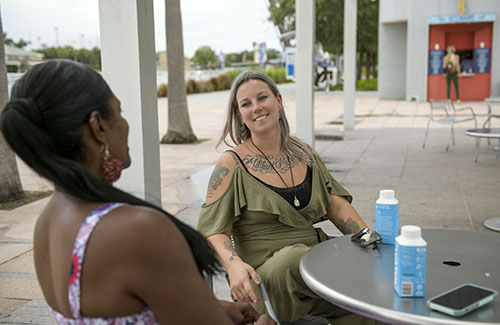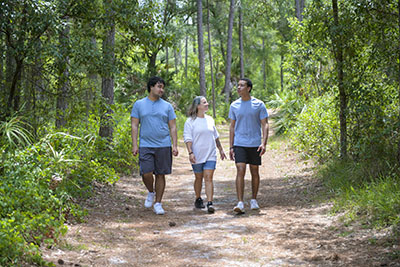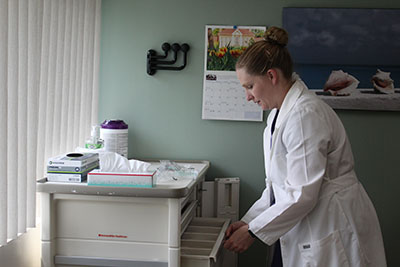Battling Barriers: Addressing Access to Care for Women Veterans

Women represent the fastest-growing population in both military service and the veteran community. However, they also face challenges in seeking care for their unique needs, including gender-specific health care. While the Department of Veterans Affairs (VA) diligently works to meet these needs, women warriors still face hurdles in accessing vital care.
Wounded Warrior Project’s (WWP®) 2023 Women Warriors Report sheds light on these challenges, including variability in care quality, longer wait times, and inconsistency in providers. These issues highlight the continued need to expand knowledge around military and gender-specific experiences to provide adequate, personalized care.
Recognizing the Needs
When the VA was first established, it was designed to serve male veterans. That changed in 1923 when the VA first established health care for women veterans. The VA recognizes the importance of supporting women veterans and meeting their needs at every life stage, but there is still more work to be done.
That’s because female veterans have unique needs, such as reproductive health care and an individualized understanding of their experiences. These experiences include menopause and military sexual trauma (MST), which WWP women warriors experience at a higher rate than male warriors. However, accessing care for their needs remains difficult. A myriad of roadblocks – ranging from geographic barriers to child care – underscore the unique challenges female veterans face.
The 2023 Women Warriors Report found that women warriors reported being the primary caregivers of their families at higher rates than their male counterparts. This means they often prioritize their family’s health care ahead of their own.
Challenges with limited child care options and availability of care for reproductive and mental health support can also delay personal care. Air Force veteran Jessica Coulter is one of many resilient women warriors navigating these complexities.
“When I was living in Rhode Island, I never asked to go to the women’s clinic because it was all the way in Providence, and I had kids,” Jessica said. “It’s difficult to schedule appointments in general, let alone having to take that long of a drive into account, plus finding someone to look after my kids, and the costs of that and the gas and the work hours lost. That’s a lot to figure out for me to go to the doctor.”
The Importance of Cultural Competence

Additional factors like service availabilities, specialized medical programs or schools in the area, and staffing numbers also influence care quality.
“My care in Tampa was so, so wildly different from the care I received in Miami,” Jessica said, emphasizing the common thread of dedicated but resource-constrained women’s health care providers.
These challenges are particularly prominent in rural areas, where geographical and workforce limitations pose additional hurdles, especially for specialized care.
“The VA is committed to achieving equitable health care and is mindful of the discrepancies in specialty-care availability that don’t align with the demand,” said Tracy Farrell, vice president of WWP Program Operations and Partnerships. “For many warriors like Jessica, these discrepancies mean they have to travel significant distances for care, which leads to challenges with child care and employment. That’s why some women veterans find it easier to forego seeking necessary care altogether.”
Veterans have two options when seeking health care: navigating the VA health care system or opting for community care referrals to facilities partnered with the VA. But, for individuals who rely exclusively on VA health care and those partnered health care providers rather than other sources of insurance, these obstacles result in significant barriers to care.
“How do we fix a system that doesn’t understand our needs when we aren’t using the system?” Jessica asked. “Its improvement in recognizing and learning our needs relies on our usage. We need adequate, fully staffed care that understands the needs of women veterans across all stages of the medical lifespan.”
Strategic Partnerships and Legislative Support to Fill the Gaps

The VA and its partners have a unique opportunity to set a global standard for women veterans’ care, ensuring consistent, high-quality services across all facilities. To take steps toward this goal, WWP recommends extending clinic hours and enhancing gender-specific services to rural and underserved areas.
Legislation is another way to continue supporting the growing needs of female veterans. WWP was proud to support the Deborah Sampson Act, which was signed into law in 2021 and sought to increase care and support for women veterans.
“Many of the initiatives included in the law are still underway,” Tracy said. “Efforts around affordable child care, more gender-specific care options, stronger community relationships with health care providers, and increased outreach regarding programs and supports for women veterans are opportunities for growth.”
In addition to advocacy for women veterans, WWP proudly partners with four medical institutions across the country through Warrior Care Network®. This program works to address mental health challenges that veterans experience and provides support for other health care-related needs. In 2023, the program provided treatment for more than 720 women. As a VA-accredited veterans service organization (VSO), WWP also advocates for women warriors during the VA claim submission process and submits claims on the veterans’ behalf. In addition, WWP helps women veterans identify and recognize their service-connected disabilities so that they can seek care and support.
By continuously seeking to understand and address the specific challenges that women veterans face, the VA and the veterans and military community can ensure dedication to serving all who have worn the uniform.
Learn more about the WWP initiatives supporting Women Warriors and join us in honoring their service and sacrifice during Women’s History Month.
Contact: Kaitlyn McCue, Public Relations, kmccue@woundedwarriorproject.org, 904.870.1964
About Wounded Warrior Project
Since 2003, Wounded Warrior Project® (WWP) has been meeting the growing needs of warriors, their families, and caregivers — helping them achieve their highest ambition. Learn more.